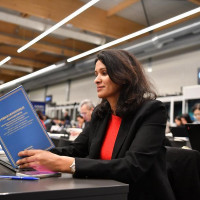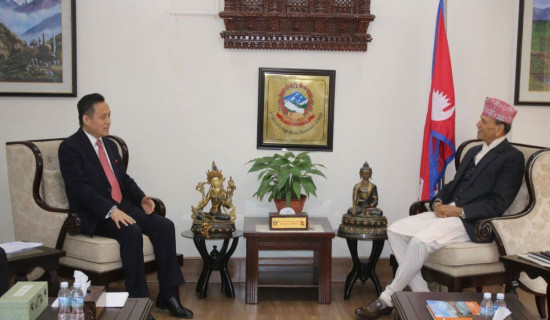- Thursday, 26 February 2026
Realising Transformational Vision Of Politics
A nation often thrives on the exciting vision of its leaders and their resolute determination to give priority to their people over power lust, where the former consciously internalises its processes. Mainstream Nepali leaders have effectively introduced a super-structural transformation of Nepali institutions. But the nation is deficient in its critical empirical indicators - educational, economic, health, technological and leadership efficacy. They are critical to lead the nation to an upland path with the conformity of its value patterns for stability and constitutional ideals of transformation. One key aspect of this transformation is the declaration of Nepal as a secular, federal, democratic republic by abolishing the old institution of monarchy, federalising the unitary polity and transforming the Hindu state into a secular one.
These super-structural changes have created space for the bloated size of the political class, bureaucracy and security agencies. But it has not elevated ecological, social and intergenerational justice and egalitarian sensibilities to reform basic structures. Execution of the transformative vision of modern politics requires delinking from the pre-modern and pre-rational political culture of cronyism through the diffusion of both rational values and cutting-edge technologies, thus bubbling up equitable progress across Nepali society’s diversity. The nation’s steady economic dip does not transform, nor does the grasp of socialism seem realistic under the conditions of international financial institutions and the boom of native interest groups.
Economic dependency
Nepal’s rising dependence, staggering debt and waning range of quality of public goods act as an Achilles heel for the durability of this transformation. A large section of people dribbles off from the political labyrinth. They deem the state of the nation not a whiff of thrill for social emancipation but of the day of the exhaustion of reformist politics, while turning the radical template of left parties for mass engagement in politics into a muddle. The style of thinking of Nepali leadership is largely shaped by personality traits, not reason-based public policy. Old habits of perfidy and maneuvering die hard. It affirms the resilience of cynical contempt for human nature, not worth people's patience for well-being.
Some leaders are elastic-like tacticians who often whirl sides, others are calculating flip-floppers who are inconsistent and habitually change their opinions and policies and still others are unbending, dogmatic ones lacking an awareness of national context and the implications of complex geopolitical changes. Each of them appeals to various audiences against each other in an undemocratic zero-sum style. Yet, they are united to indulge in elite negotiation for power irrespective of their dissimilar identities. In no way do they offer robust responses to the ecological, social, economic and political needs of Nepalis.
Neither of them is concerned with the diffusion of democracy in society, outreach of the social welfare state and cohesive development policy outreach where even common folks feel their stake, ownership and benefits of transformation dividends. The wise leaders who are mindful of the constitutional spirit and universal feelings of freedom, equality and solidarity and national concerns are fading fast. As a result, the transformational vision rooted in popular sovereignty, self-rule, inclusion, justice, dignity and choice at the grassroots level is yet to be animated to offer equal freedom to all Nepalis and mediate the local alternatives.
The penchant of all Nepali political parties to veer to the establishment without summoning the people of conscience has bred multiple forms of opposition, each delegitimising the other rather than shaping common ground for positive collective action. The challenge for Nepalis is how to save leaders from themselves and attune their behaviour to constitutionalism. The fractious political landscape has opened a gap between the establishment and flimsy opposition in the parliament and the streets, a split of rivals and an inter-generational leadership brawl within each political party, which has made their coexistence wearing, not exhilarating for transformation.
The freewheeling public debate in the digital platform often distrusts and divides the media, civil society, bureaucracy and the courts, the custodian of Nepalis' rights and defenders of the constitution. As the elites do not have checks, they have distributed the nation’s wealth to the creamy layers of society at the top. It hardly trickles down to the people to generate the belief that democracy cares for the dispossessed and it is a better system than its alternatives and, therefore, healthier to live in the nation than migrate abroad to eke out a living.
The dialogue between the radicals and spoilers in the public platform is uncreative as both subvert the transformative vision of politics and take into account many issues, including climate change and justice to youth, women and deprived members of Nepali society for a shared future. Nepali leaders are less prepared to trudge through the safe path of transformational vision and give people a credible sense of optimism by creating a kind of stakeholders’ society they desire and deserve.
The mood of anomie in the nation, propelled by uncontrolled self-indulgence, yearning for privilege and patronage, has deepened the frustration of people, the anxiety of leadership for survival and the peril of its dislodgment by a chorus of roaring anti-system, anti-parties and anti-establishment agitations. The politics of everyday crowd demonstrations in the streets only indicate a sense of distraction. Pulling politics to opposite extremes can easily erode the democratic middle path for moderation, toleration and resolution of conflicting interests by optimisation. It can create a stable milieu for effective multi-level governance.
Nepali leaders have failed to reform the political culture of parties through the democratisation of their inner life deeply infected by domination of big men and their cronies. Through control of cadres, use of nasty idioms against opponents and focus on difference who knows no way to engage in a dialogue to sort out national problems is the persistent malaise. Transformation entails a shift from agitational and electoral machines to the creation of the institutions of people who hear their voices, speak plain language understandable to them and work together to uplift their conditions.
What annoys Nepalis is the irresolution of the dichotomy between leadership promises, skewed delivery and their collusion with special interest groups who peddle inordinate influence, exert power and provide unaccountable finances thus putting off the transformative drive. The establishment can do anything to keep its grip in power. But it has not shown any audacity to face up to corporate and geopolitical power for fear of losing donations for political campaigns, election financing, personal enrichment and legitimacy. They cannot challenge NGOs and civil society engaged in culturally insensitive social engineering and soft-power projection in native society, instead of spurring social and national integration.
Nepali leaders thus face a hard choice in amending the constitution for fear of cracking Pandora’s Box or changing the status quo, which is the basis of survival. Undue partisan focus of Nepali leaders has abridged the leeway of transformation of Nepali politics to a participatory turn and to shore up collective progress demanded by a myriad of new social movements. All the impulses of reaction arising out of historical awareness, nostalgia, reform of the structural and political culture of patronage, rebellion against the establishment for better life, livelihood, liberty and the incumbent’s resistance against them set Nepali political life stirring.
Transformation calls for altering the condition of stasis, showing readiness to uproot the root causes of injustice and halting the migration of dynamic youths abroad and the critical mass of change agents of Nepali society stifling both transformation and production revolution. The establishment’s fear of transformation arises from three sources: the temptation of monarchist forces to establish Hindu state and constitutional monarchy and subvert what it calls gains, populist forces mauling on a spike on impunity, corruption and nexus of crime with political economy and progressive forces assault on inapt economic policies having negative implications for domestic resource mobilization, production and responsive governance essential for social transformation.
The establishment is robust to monopolise all state institutions and distribute posts to clients akin to the ancien regime and suffocating meritocracy, thus putting democracy at greater stake. The transformational change does not come through electoral politics only but by unleashing the dynamic forces of society, coordinating their energy and expanding the engagement of people in social transformation. The erosion of the efficacy of all the institutions of democracy has made Nepal face a systematic crisis of public trust, existential threat from climate change, economic decline, migration of youth and feral social struggles. The only safety valve for people appears to be joining the global labour market for national economic life and personal and family security.
Sustainable progress
The welfare state promised by the constitution is unable to address all rights and expedite sustainable progress. The syndicated regime of Nepal rotates power among a few leaders at the top of the party pyramid over and over again, shattering the democratic spirit of the circulation of new elites in the nation’s body politic to make it functional and create the stake of all classes of people. The cost of the shrewd maneuver of leadership is too great for the nation and people to ardently greet. Nepalis expect their leaders to take their side, not the interest groups and geopolitical interests or favour the business tycoon with huge tax breaks.
The transformative idea requires the moral source of contemporary good life nourished by structural reforms and justice across all spheres of governance, not only rhetorical rants. The duties of political conglomerates lie in the rekindling of hope from the lesions of failure of political institutionalisation, saving Nepalis from their wretched condition, alleviating the fear of scarcity and uncertainty and skewed interpretation of the order of their governance. The cognitive openness of leaders to grassroots feedback can make them more creative and innovative for adaptation to changing times.
(Former Reader at the Department of Political Science, TU, Dahal writes on political and social issues.)







-square-thumb.jpg)





-original-thumb.jpg)


